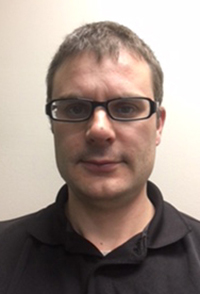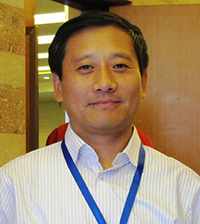
The Entomological Society of America's 2018-2019 elections, conducted via electronic ballot, are now open (opening on July 23, 2018), and close August 24, 2018, at 11:59 p.m. U.S. Eastern Daylight Time. Below, the candidates for positions within the Society and several ESA Sections and Branches are listed.
Members will also vote on Honorary Members and proposed amendments to the ESA Bylaws during the election period. Click below to learn more:
For additional information on voting, see ESA voting instructions. Questions? Contact elections@entsoc.org.
Click below to see 2018-2019 candidates for:
- ESA Society Elections
- Certification Board Elections
- Medical, Urban, and Veterinary Entomology (MUVE) Section Elections
- Physiology, Biochemistry, and Toxicology (PBT) Section Elections
- Plant–Insect Ecosystems (P-IE) Section Elections
- Systematics, Evolution, and Biodiversity (SysEB) Section Elections
- Eastern Branch Elections
- International Branch Elections
- Southwestern Branch Elections
ESA Society Elections
- Timothy D. Schowalter, Louisiana State University
- Michelle S. Smith, Corteva Agriscience™, Agriculture Division of DowDuPont™
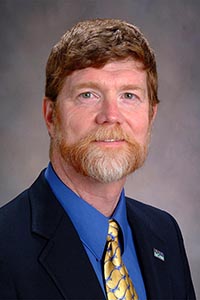
Louisiana State University
Dr. Timothy Schowalter is Professor and former Department Head of Entomology at Louisiana State University. He received his Ph.D. from the University of Georgia and was a postdoc at Texas A&M University before moving to Oregon State University as an Assistant Professor in 1981. He was promoted to Professor in 1993 and served as Interim Head before moving to LSU in 2003.
His research on insect responses to disturbances and the effects of these responses on ecosystem structure and function has been published in four books, including Insect Ecology: An Ecosystem Approach and Insects and Sustainability of Ecosystem Services, three invited review papers, 80 peer-reviewed journal papers and more than 50 book chapters and other publications. He has served ESA as SEB representative on the Governing Board and as associate editor. He also has served as Program Director for Ecosystem Studies at the National Science Foundation and Vice President for Public Affairs, Ecological Society of America. He is a Fellow of the Ecological Society of America.
Schowalter says, "I am committed to the goals of the ESA. I support broadening of member diversity, promoting professional opportunities for all members, communicating entomological science to policy-makers, and coordinating entomological science globally. My service as SEB Representative on the ESA Governing Board has provided experience with ESA governance and opportunities available to ESA members. I will work to encourage membership among students and early career professionals and to ensure that all members benefit from the networking, publication, educational and professional development opportunities provided by ESA."
VP-Elect Candidate Statement:
ESA faces several critical issues in the coming years. How should ESA address issues of professional misconduct? We currently have a policy regarding misconduct at meetings, but we also need to develop a policy regarding professional misconduct outside of meetings. Because we are a professional society, we should expect professional conduct by our members in all situations, not just meetings. We will need to decide what actions should be taken to ensure that members found guilty of misconduct at their home institutions are properly sanctioned by the society. For example, should such members be stripped of ESA membership and stripped of ESA awards or other recognition?
We also face challenges in representing our science to policymakers and the general public. We have developed a Science Policy program and have Lewis-Burke Associates representing us in Washington, DC, but how can we increase visibility and use of scientific data in decision-making? We have supported member participation in the March for Science. Other options, such as increasing Congressional briefings on entomological topics, would require additional resources from ESA’s budget. Would this be cost-effective?
Finally, how can we continue to encourage and support participation by, and recognition of, early career professionals and under-represented groups? Students and early-career professionals are the future of the profession and are increasingly diverse categories of ESA membership. How can we ensure that they are represented in our governance structure and among our awardees so that they see ESA as a supportive professional organization?
—Timothy D. Schowalter
 Michelle S. Smith
Michelle S. Smith
Corteva Agriscience™, Agriculture Division of DowDuPont™
Michelle Smith is Associate R&D Director and a leader in the Research and Development Transformation Office, currently fully dedicated to the successful integration of R&D across Corteva Agriscience™, Agriculture Division of DowDuPont™. Prior to this role, Michelle led a Dow AgroSciences team responsible for early stage development of traits in corn. She has held other leadership and technical roles including leading a US-based field science group developing products for the urban pest, turf and ornamentals and range and pasture markets, and leading a global biology team for the Sentricon™ system.
Michelle has over 20 years of business and R&D experience in pest management, technology transfer, and communications. Michelle received her B.A. degree from Hollins University and her Master's degree in entomology from Virginia Polytechnic Institute and State University. She is a Board Certified Entomologist and has served the Entomological Society of America in numerous capacities including currently serving as ESA Treasurer. Michelle has contributed to ESA through the Education and Youth Committee, North Central Branch Honorary Awards Committee, Stan Beck Fellowship panel, and Science Policy Capability Committee, as well as Medical, Urban, and Veterinary Entomology Section Treasurer, co-organizer of Member Symposia, and a Program Symposium on Diversity in Entomology. Michelle engages in outreach as a Corteva Agriscience Science Ambassador for science programs directed to children and is active in the Corteva Agriscience Hunger Solutions Network. Michelle is an advocate for encouragement of women in the field of agriculture and entomology, and was a driving force behind formation of the ESA Special Committee on Diversity & Inclusion.
VP-Elect Candidate Statement:
The Strategic Principles of ESA are strong and time-tested guideposts for steering our society into the future. Within these principles there also lies significant opportunity to shape our continued development. Accelerating progress can extend our leadership among peer societies as an organization that anticipates important challenges—being first to lead will empower ESA membership to profoundly influence the environment within our science and external to it.
There are many challenges entomologists face today in science policy and funding, climate change, invasive species, political volatility, shrinking university departments, and industry consolidation. Science policy and communications initiatives must be sustained to address these challenges. Within ESA we are reexamining our governance structure with a goal to increase agility and responsiveness to our members, analyzing member views on volunteerism, and asking ourselves tough questions about paradigms and how we recruit and develop new ESA leaders, all initiatives I support. At the same time, I realize that investing in growth must be balanced with good fiscal stewardship and with maintaining our core responsibilities of providing first-class venues for publications, recognition, and sharing insect science globally.
I have invested in ESA in different roles over time and strongly believe that these challenges are indeed opportunities. ESA is for everyone who identifies as an entomologist, whether we are student, technician, practitioner, hobbyist, research director, or eminent professor; each entomologist brings something unique and valuable to our Society. Cultivating these contributions to benefit an inclusive ESA will be my great privilege if I am elected.—Michelle S. Smith
- Lina Bernaola, Louisiana State University
- Kadie Elizabeth Britt, Virginia Tech
- Priyanka Mittapelly, The Ohio State University
- Nicole Quinn, Virginia Tech
 Lina Bernaola
Lina Bernaola
Louisiana State University
Lina Bernaola was born in Lima, Perú. She is an entomology doctoral candidate at Louisiana State University (LSU). Her research involves investigations of the effects of mycorrhizal fungi, a symbiotic soil-borne organism, on rice resistance to insect herbivores and pathogens. Lina earned her B.S. in biological sciences from San Marcos National University and later completed her M.S. in agronomy at LSU.
Lina has been actively involved in ESA since 2013. She has presented her research at several national and Southeastern Branch meetings; she has also participated in LSU's Linnaean Games and Student Debate teams. Lina is a member of the Plant-Insect Ecosystems (P-IE) Section and has served on the P-IE Governing Council as the Student Representative as well as on the Student Affairs Committee. In all of these leadership positions, she worked on students' needs and assisted in organizing different symposia, student debates, workshops, and lunch and learn sessions at branch and national levels.
Lina currently serves as the Student Representative to the Governing Board. She has learned a lot about the Society, especially regarding the structure of ESA. By running for a second term, she would be honored to continue working hard at the core of ESA, to promote a community that is inclusive of diversity and to entice more active members for the growth of the Society. She enjoys serving ESA because it is the largest insect-science society in the world. As such, it is uniquely positioned to engage and network with organizations worldwide to take on entomological challenges we face in the coming years.
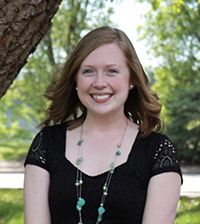 Kadie Elizabeth Britt
Kadie Elizabeth Britt
Virginia Tech
Kadie Britt is a native of Marshville, North Carolina. She received a B.S. in environmental studies from Emory & Henry College in Emory, Virginia, in 2013. After graduation, she worked closely with Dr. Erika Scocco Niland, an entomologist, at Wingate University in Wingate, North Carolina. Dr. Niland shared her love of entomology with Kadie and inspired her to pursue a future with insects. In May of 2014, Kadie joined the Department of Entomology and Plant Pathology at the University of Tennessee, Knoxville, where her research focused on ecology, biology, and life history of the kudzu bug (Megacopta cribraria) in east Tennessee. In 2017, Kadie began doctoral research at Virginia Tech in the Department of Entomology. She is currently studying the effects of insect pests on industrial hemp and is guided by Dr. Thomas Kuhar. At Virginia Tech, she is a recipient of a doctoral fellowship through the graduate school.
Kadie has been an active member of the Entomological Society of America since 2015. She has presented her research at four branch meetings and two national meetings, including two invited presentations. Kadie has competed in the Linnaean Games in the Southeastern and Eastern Branches and served as the student representative of the resolutions committee for the Southeastern Branch in 2016. She is the moderator and co-organizer of a member symposium at the 2018 Joint Annual Meeting in Vancouver. Kadie is the vice president of Virginia Tech's graduate student entomological society. She loves sharing the joy of insects with everyone around her.
 Priyanka Mittapelly
Priyanka Mittapelly
The Ohio State University
Priyanka Mittapelly is an entomology Ph.D. candidate advised by Dr. Andy Michel at The Ohio State University (OSU). Her doctoral research focuses on the molecular interactions between the brown marmorated stink bug (BMSB) and its endosymbiont. Her studies advance current knowledge on BMSB biology, helping lead to the development of novel management tactics.
She is an active member of the Entomology Graduate Student Association (EGSA), where she served as Vice President representing graduate students at OSU and organizing multiple meetings. She takes active roles at EGSA's outreach events, which has further improved her communication skills. Recently, Priyanka chaired a subcommittee of the DuPont Pioneer Plant Sciences Symposium, where she organized and led the student competition and assisted students attending from the U.S. and Canada.
Her service to the community reaches beyond OSU. She consistently volunteers at the ESA regional and national meetings and has won awards for travel and student competition. She is the current Student Member-at-Large of the ESA-North Central Branch Executive Committee. This position gives her the opportunity to participate in leadership and decision-making processes for the branch. If elected as Student Representative to the ESA Governing Board, she will act as a liaison between the Executive Committee and Governing Board and connect student ESA members via the Student Affairs Committee.
Priyanka's service experience with both scientific and non-scientific audiences has improved her leadership and networking skills. This makes her a qualified candidate for this position to provide the best representation and advocacy for diverse students at a national level.
Nicole Quinn is a Ph.D. Candidate at Virginia Tech in the Department of Entomology. She studies the behavior and biological control of the brown marmorated stink bug (Halyomorpha halys). She is passionate about entomology and science outreach. Nicole graduated from Gettysburg College in 2012 with a Bachelor of Science in biology and a minor in English. Her interest in research and insect ecology was reinforced by her experiences within the biology department on campus, a semester abroad in Ecuador, a thesis project in South Africa, and an internship at the Penn State Fruit Research and Extension Center.
After graduating in 2012, Nicole worked at the Journal of Visualized Experiments in Cambridge, Massachusetts, followed by field work in east Texas with Stephen F. Austin State University. In 2013, she began her M.S. at Michigan State University on habitat management for beneficial insects in cucurbit agroecosystems. She graduated in December 2015 and started her Ph.D. at Virginia Tech in January 2016.
She has served on the Student Affairs Committee in both the North Central Branch during her Master's and the Eastern Branch during her Ph.D. She has organized and/or moderated four symposia at ESA meetings in the past three years, including a Plant-Insect Ecosystems Section symposium. In total during her graduate career, she has given 25-plus scientific and extension presentations in 10-plus states, including every national ESA meeting and most local branch meetings since 2013.
Certification Board Elections
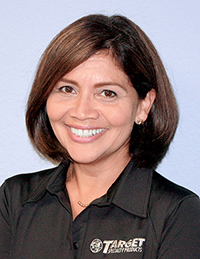 Sylvia Kenmuir
Sylvia Kenmuir
Target Specialty Products
I am a Board Certified Entomologist and licensed Pest Control Adviser. I am the Director of Technical Training for Target Specialty Products based out of Santa Fe Springs, California. We are a national distributor of pest management supplies, and I have been with Target for 30 years.
My role with Target consists of managing and creating all technical training content for CEU's as well as hands on training programs for Pest Management Professionals. My focus is on the specialty markets including Structural Pest Control, Fumigation and Regulatory compliance. My department trains over 18,000 PMP's annually in all areas of certification nationwide. We also assist with licensing certification preparation courses for state licensure for applying pesticides.
In the last few years, I started to provide a 10-week online ACE prep course geared to assisting licensed PMP's acquire this valuable credential. I also work with established industry experts in becoming a BCE and offer study prep and proctoring. I am passionate about what we do to protect human health, and I often speak and educate on a variety of topics including urban pests, integrated pest management, and regulatory issues. I am the rodenticide task force and west coast rodent academy chair for Pest Control Operators of California as well as a board member for Nevada Pest Management Association.
- Alan Feuer, Preventative Pest Control
- John David Schoepke, Terminix
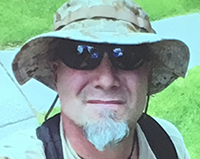 Alan Feuer
Alan Feuer
Preventative Pest Control
The following recommendation is provided by Dr. Robert W. Davis, BCE:
"I have worked with Alan on New Mexico Pest Management State Association (NMPMA) and National Pest Management Association (NPMA) events. Alan has passion for the industry. He believes that knowledge and professionalism across the industry will help all.
Alan is one of the best Technical Directors I have worked with. He is a respected licensed professional within the industry, his community, and the ACE program. He provides training, teaching and support for the pest professionals in his company as well as others in the Southwestern U.S. Alan is a member of the NPMA Wood Destroying Organism & Technical Committees. Alan has been a driver in organizing and providing Pest Management Professional training events in New Mexico. He has helped PMP's keep current in licensing and expertise in Urban Pest Management.
Alan is a supporter of his state and communities. He has served our country as a Marine and has passion for our veterans. He is active in his church community and helps many with their faith.
Alan is an active supporter of the ESA and the Certification Program. He is an ACE and has promoted the program to interested Pest Management Professionals and set up exam proctors for ACE applicants. Alan organized an ACE review course and testing opportunity at the 2017 NMPMA meetings. He helped 20-plus ACE applicants prepare for the exams.
As a past Director of the Certification Program, a BCE, and supporter of the ACE program, I attest that Alan qualifies for this ACE position."
John Schoepke has worked in pest management for over 14 years employed by Terminix. He carries licenses in the state of Tennessee in General Pest and Rodent Control (GRC) and Wood Destroying Organisms (WDO).
John currently serves as a manager with Terminix, working to help develop people through training in the knowledge and skills required of pest management professionals.
John recently became an ACE, and he proudly aspires to use the honor and skills of the ACE to better serve and help develop a broader community of pest management professionals through the promulgation of continued training and education.
MUVE Elections
 Michael Hay Reiskind
Michael Hay Reiskind
North Carolina State University
Michael Hay Reiskind is an associate professor at North Carolina State University (NCSU), Raleigh, in the Department of Entomology and Plant Pathology. He has been at NCSU since 2012, leading a research and teaching program in medical entomology. He was raised in Gainesville, Florida, where he gained an appreciation for the diversity of arthropods and an interest in those that bite and suck blood. He earned a B.A. from Amherst College and did undergraduate research on infectious disease evolution in an insect virus with Paul Ewald.
After working at the University of Florida post-college, he went to the University of Michigan School of Public Health, where he studied mosquito ecology in the context of human disease transmission. When he finished a Master's in Public Health, he stayed at the University of Michigan to do a Ph.D. in biology under the direction of Mark L. Wilson, studying Culex ecology. He then became a postdoctoral associate at the Florida Medical Entomology Laboratory in Vero Beach, Florida, working with L. Phil Lounibos on container Aedes ecology.
In 2008, he moved to Oklahoma State University, Stillwater, as an assistant professor, where he was for four years. He has authored over 45 peer-reviewed publications and has served on the Editorial Board of the Journal of Medical Entomology, as well as organized two program symposia at ESA Annual Meetings. He is the current Past President of the North Carolina Mosquito and Vector Control Association and the Editor-in-Chief of its newsletter, The Biting Times.
 Glen A. Scoles
Glen A. Scoles
USDA, ARS, Animal Disease Research Unit, Washington State University
Dr. Glen A. Scoles received his B.S. in entomology from Cornell University (1980) then was employed there as a technician in medical and veterinary entomology (1980-86). He then took a position for Johns Hopkins University as field supervisor of the Onchocerciasis Research Project in Liberia (1986-87). After returning to the U.S. he again worked as a technician at Cornell in insect chemical ecology until beginning graduate work at the University of Notre Dame in 1990. He earned M.S. (1994) and Ph.D. (1997) in biological science working on transmission of canine heartworm by Aedes albopictus. Postdoctoral training included work on African swine fever virus transmission by Ornithodoros ticks at the USDA, Plum Island Animal Disease Center (1996-98), and work on Ixodes scapularis and Borrelia miyamotoi at Yale University (1998-2000).
Dr. Scoles joined the USDA, ARS, Animal Disease Research Unit at Washington State University in 2000 as a Research Entomologist, where he remains today. Dr. Scoles conducts research on ticks and tick-borne pathogens of livestock. Current research focuses on anti-tick vaccination of livestock and on transmission of bovine babesiosis and anaplasmosis and equine piroplasmosis. Scoles holds adjunct faculty appointments at Washington State University and the University of Idaho.
He has been a member of ESA since 1989. ESA leadership roles have included: Section D representative, Education and Youth committee (2003-2006); Annals Editorial Board (2009-2012); Medical, Urban, and Veterinary Entomology Section representative, Publications Council (2014-present); and Science Policy Fellow (2017-present). He has also frequently served as student competition judge, session moderator, and symposium organizer at ESA annual meetings.
 Nathan D. Burkett-Cadena
Nathan D. Burkett-Cadena
Florida Medical Entomology Laboratory, University of Florida
Dr. Nathan D. Burkett-Cadena is Assistant Professor of Entomology at the University of Florida, Florida Medical Entomology Laboratory in Vero Beach, Florida. After receiving his Ph.D. in entomology from Auburn University (2010), Dr. Burkett-Cadena was a postdoctoral researcher at the University of South Florida Department of Global Health from 2011 to 2013. His research interests focus on surveillance and ecology of vector-borne diseases including eastern equine encephalitis virus, Everglades virus, Venezuelan equine encephalitis virus, West Nile virus, epizootic hemorrhagic disease virus, and river blindness.
Dr. Burkett-Cadena has co-authored 45 scientific publications related to medically important arthropods and the pathogens that they transmit. He is also author of the book Mosquitoes of the Southeastern United States (2013, University of Alabama Press). He lives with his wife, Marleny, and son, Daniel, in Vero Beach, Florida. He has been a member of the Entomological Society of America, in good standing, since 2003.
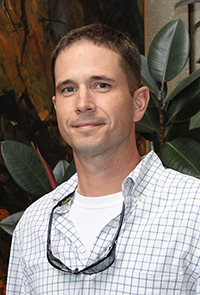 Robert Puckett
Robert Puckett
Texas A&M University
Dr. Robert Puckett was hired as Assistant Professor and Extension Entomologist at Texas A&M University during Fall 2014. He completed his Bachelor's and Master's degrees in the Department of Biological Sciences at Sam Houston State University in 2003 and his Ph.D. in the Department of Entomology at Texas A&M University in 2008. His dissertation work addressed the ecology of introduced ant-decapitating flies and their interactions with red imported fire ants, with the goal of improving fire ant biocontrol.
The success of his graduate student research and his service to the Entomological Society of America resulted in him being awarded the John Henry Comstock Graduate Student Award. After completing his graduate studies, he joined Dr. Roger Gold as a research scientist at the Rollins Urban & Structural Entomology Facility (formerly the Center for Urban and Structural Entomology) at Texas A&M University. Since then, his research has primarily involved investigations of the biology, behavior, and management of invasive social insect species including red imported fire ants, tawny crazy ants, and Formosan subterranean termites. Additionally, he is engaged in research involving a wide variety of urban insect pests including bed bugs, cockroaches, flies, and ornamental pests.
Dr. Puckett has published 25 scientific articles and has given more than 200 presentations at professional meetings and scientific conferences. Additionally, he served on the ESA Ethics and Rules committee for several years during and after his graduate work and served as chair for two years.
- Ary Faraji, Salt Lake City Mosquito Abatement District
- Shripat T. Kamble, Department of Entomology, University of Nebraska, Lincoln
- Jerry Zhu, USDA-ARS AMRU
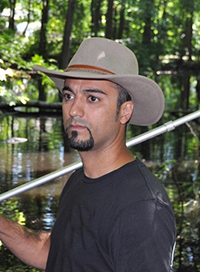 Ary Faraji
Ary Faraji
Salt Lake City Mosquito Abatement District
Dr. Ary Faraji is an accomplished scientist with a Ph.D. from Rutgers University. He is currently the Executive Director of the Salt Lake City Mosquito Abatement District, and his 69 peer reviewed and 71 non-peer reviewed publications are evidence he remains active in disease vector research. Many of these publications are in ESA publications.
He was an integral part of the Asian tiger mosquito project, which was a wide-area integrated vector management program for control of this invasive mosquito. Dr. Faraji continues promoting research and public interaction to support the control of disease vectors and has over 66 extension/outreach and 232 presentations.
He has been an active leader in many associations and he will be the future president of the American Mosquito Control Association.
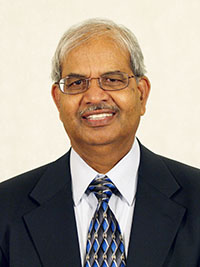 Shripat T. Kamble
Shripat T. Kamble
Department of Entomology, University of Nebraska, Lincoln
Dr. Shripat Kamble received his Ph.D. in entomology from North Dakota State University. He served the University of Nebraska-Lincoln for 38 years. Kamble's research focuses on the environmental fate of termiticides, baiting technology, molecular techniques and insecticide resistance and application of molecular techniques. He has made significant contributions to determine movement and degradation of termiticide and bioefficacy of insecticides against cockroaches, ants, termites and bed bugs. He has gathered pesticide-use data impacting urban and livestock settings and participated in national/regional pesticide reviews.
Kamble has advised eight M.S. and 11 Ph.D. graduates and served on three Ph.D. supervisory committees.
He has authored or coauthored 157 papers, 174 presentations, and 53 symposia. His grants of $3.55 million have supported research and extension programs. He has received 33 awards and recognitions, the notable few including: distinguished achievement, urban entomology; director, ESA certification; national recognition, urban entomology; honorary ESA member; BCE distinguished service; IR-4 meritorious service; North Central Branch (NCB) CV Riley; NCB award of merit; and NCB recognition, urban entomology, among others.
His ESA leadership has comprised of being a Section F Governing Board member (2001-2006), director of certification program (2012, 2000), and BCE examining committee chair (2004-present). He served as chair of the national conference on urban entomology (2000) and program co-chair (1998). He has been an active ESA member since 1970 and participates in ESA meetings faithfully. His contributions to NCB-ESA include co-chair of local arrangements (2012), executive member at large (2006-2008), awards committee chair (1994), program committee member (1993-1999) and graduate student awards committee (1991).
Shripat will appreciate an opportunity to represent the Medical, Urban, and Veterinary Entomology Section to JME editorial board.
Jerry (Junwei) Zhu, Ph.D., is a Research Chemical Ecologist/Entomologist at USDA-ARS. He has also been an Adjunct Professor of Entomology at the University of Nebraska since 2010. He received his Ph.D. in Chemical Ecology in 1995. He has worked in various universities and industry and research institutes in the U.S. and Europe. His research focuses on semiochemical-based pest management (particularly in discovering novel natural repellent/attractant compounds and practical applications for medical and veterinary pest insects).
He has over 100 scientific publications, with six U.S. patents and several developed commercial products from his inventions. Dr. Zhu has conducted chemical ecological studies on blood-sucking insects in the last 20 years. He has also served as a guest editor of the Journal of Chemical Ecology for the special issue titled, "Semiochemicals in Pest Management: Development, Regulation Applications."
He is a subject editor for ESA's Journal of Insect Science and has joined editorial boards of several international journals. He is the President-Elected of ISCE (2018). He previously served as the President of Asia-Pacific Association of Chemical Ecologists and the Overseas Chinese Entomologists of America.
PBT Elections
- Troy Anderson, University of Nebraska
- Ronda Hamm, Corteva AgriScience
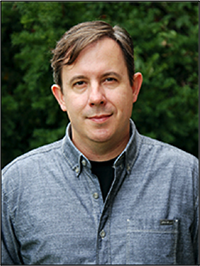 Troy Anderson
Troy Anderson
University of Nebraska
Dr. Troy Anderson is an Associate Professor of Physiology in the Department of Entomology at the University of Nebraska. He earned B.S. and M.S. degrees in biological sciences from Wichita State University and a Ph.D. degree in entomology from Kansas State University and was a Postdoctoral Fellow at Virginia Tech. His research program focuses on the broader aspects of physiology and biochemistry that integrates toxicological, pharmacological, molecular, and genomic approaches to address fundamental questions in model insects, disease vectors, and agriculture or urban pests. He oversees an interdisciplinary team of young scientists trained to provide knowledge on the modes of action, discovery and development, resistance monitoring and management, and safety and regulation of insecticidal chemistries.
Dr. Anderson has leadership experience serving as an elected member of the Executive, Planning, Development, and Early Career Scientists Committees for the American Chemical Society (ACS) Division of Agrochemicals (AGRO). He is a long-time member of the Physiology, Biochemistry, and Toxicology (PBT) Section of the Entomological Society of America (ESA) where he is an active judge, organizer, and moderator for symposia and award competitions.
Dr. Anderson is Co-Chair for the INSecticide TARgets (INSTAR) Summit Liaison Group of ACS AGRO and ESA PBT. He serves as associate editor for Pest Management Science, associate editor for the Journal of Economic Entomology, Editorial Board member of Arthropod Management Tests, and guest editor for Pesticide Biochemistry and Physiology. He has 160-plus scientific, extension, and instructional conference and workshop communications related to the management of disease-transmitting arthropods and protection of pollinating insects
 Ronda Hamm
Ronda Hamm
Corteva AgriScience
Dr. Ronda Hamm received her B.S. in agricultural education at Fresno State University and her M.S. and Ph.D. in entomology from Cornell University. Currently the Global Academic Relations Manager at Corteva Agriscience, she collaborates with internal and external stakeholders to build science outreach and education opportunities.
Ronda has been involved in a variety of entomological pursuits, conducting research in the areas of pheromones, biological control, genetics, toxicology, resistance, urban pest management, and biotechnology. With 20 publications and six patent applications, Ronda has a deep appreciation for the diversity of insect science and its impact on our lives.
An active member of ESA Physiology, Biochemistry, and Toxicology Section and Medical, Urban, and Veterinary Entomology (MUVE) Section, Ronda is currently serving as the Education and Outreach Committee representative for MUVE. She was the 2017 North Central Branch local arrangements chair. She received the 2008 International Congress on Insect Neurochemistry & Neurophysiology recognition award. She has served the Entomological Foundation as a member of the Board of Counselors, a teacher workshop presenter and contributor for the interactive online game. Ronda has organized a number of member symposia at annual ESA meetings.
In 2016, Ronda was awarded the Distinguished Informal Educator Award from the National Science Teachers Association for her work in founding successful science, technology, engineering, and mathematics programs. Additionally, she is an adjunct faculty member at Ball State University.
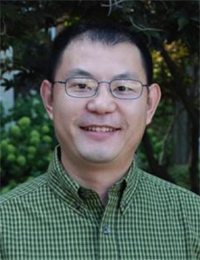 Xuguo "Joe" Zhou
Xuguo "Joe" Zhou
University of Kentucky
Dr. Xuguo (Joe) Zhou is an Associate Professor in the Department of Entomology at the University of Kentucky. He earned his B.S. from the Beijing Agricultural College, M.S. in entomology from the Chinese Agricultural University, and his Ph.D. from the University of Nebraska. He was a postdoctoral researcher at Purdue University and the University of Florida.
His research program at the University of Kentucky is a marriage between basic and applied research with an integrative genomics platform. His overall research goal is to integrate molecular biology and "omics" tools with fundamental biological disciplines to address some long-standing biological questions with practical implications. Specifically, the directions of his research program at the University of Kentucky include: 1) digestomics research on wood-feeding Dictyoptera, 2) behavioral genomics study of eusocial termites, and 3) the regulatory and technical challenges of RNAi-based pest management.
He is a long-time member of the Physiology, Biochemistry, and Toxicology (PBT) Section of the Entomological Society of America (ESA), where he is an active judge, organizer, and moderator for symposia. He has served as PBT Section Representative to the Journal of Economic Entomology Editorial Board and is completing his first term and seeking re-election.
 Elizabeth Beckemeyer
Elizabeth Beckemeyer
Georgia Perimeter College
Dr. Beckemeyer has served the ESA as Governing Board Representative (2002-05), Officer for Section B (1994-97), Chair of the Standing Committee on Ethics (1992-94), member of the Standing Committee on Rules (1999-2004) and Committee on Awards and Honors (2010-13), and Chair (2002) of the Editorial Board of American Entomologist. She is currently Assistant Professor of Biology at Georgia Perimeter College in metro Atlanta.
Beckemeyer has been a member of ESA for 40 years, joining the Society as an undergraduate at Georgia Southern College. After receiving her B.S. in biology, she studied insect oogenesis, receiving her M.S. in entomology at the University of Georgia, M.A. in zoology at Duke University, and Ph.D. at the University of North Carolina at Chapel Hill. A year as an AAAS Science, Engineering and Diplomacy Fellow (1987-88) broadened her view of the role of scientific societies in promoting diversity in science. In 1989, she founded the Women in Entomology Breakfast that continues today as an important networking event at the Annual Meeting. She also held leadership diversity workshops that revealed the mechanisms of nominations, committee membership, editorial board compositions, and programming to the entire membership.
She initiated the use of email to communicate with the entire membership of the Society, constructing email directories for sending section news and programming updates to each Section. She continues to advocate openness in the operation of the Society as the best route to diversity within the organization. Dr. Beckemeyer has served as the Physiology, Biochemistry, and Toxicology Section Representative to the Thomas Say Editorial Board and is seeking re-election.
P-IE Elections
- Fiona L. Goggin, University of Arkansas
- Ruth Arabelle Hufbauer, Colorado State University
- David Onstad, Corteva Agriscience, Agricultural Division of DowDuPont
- Cesar Rodriguez-Saona, Rutgers University
- Helen Spafford, University of Hawaii
 Fiona L. Goggin
Fiona L. Goggin
University of Arkansas
Fiona L. Goggin received a B.S. in plant science from Cornell University and a Ph.D. in entomology from the University of California, Davis. She is a full professor in the Department of Entomology at the University of Arkansas, where she has been a faculty member since 2001. Her research focuses on host plant resistance to insects, and she teaches Insect Physiology and Molecular Biology.
Dr. Goggin has published 33 peer-reviewed articles, one book chapter, and nine other publications and is the recipient of the 2001 ESA Starks Plant Resistance to Insects Research Award and the 2014 Southeastern Branch (SEB) Recognition Award in Insect Physiology, Biochemistry and Toxicology. She has organized one program symposium, one Plant-Insect Ecosystems (P-IE) Section symposium, and one member symposium for ESA's annual meetings; judged P-IE student presentations; and served as a member of the Entomological Foundation, the SEB membership committee, the SEB member awards committee, and the ESA Starks Plant Resistance to Insects Research Award judging committee.
She is on the leadership team of the Plant Imaging Consortium, which applies cutting-edge technologies to study crop stresses such as insect infestations, disease, and abiotic stresses. Dr. Goggin has also served as a panel manager for the U.S. Department of Agriculture's National Institute of Food and Agriculture and a panelist for USDA and the National Science Foundation; edited a special issue on plant resistance for Current Opinion in Insect Science; served on the editorial board of the Journal of Chemical Ecology; organized regional workshops on grantsmanship, professional development, and science education; and participated in K-12 outreach activities that have reached approximately 20,000 students.
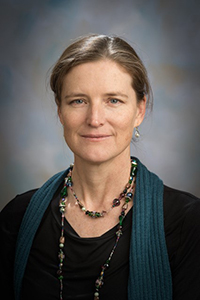 Ruth Arabelle Hufbauer
Ruth Arabelle Hufbauer
Colorado State University
I am an entomologist and applied evolutionary ecologist at Colorado State University. My Ph.D. is from the Department of Entomology at Cornell University. I am currently a Full Professor. Plant-insect interactions are at the core of my research interests, including biological control and biological invasions. I have also used model systems (mainly Tribolium) to study processes that govern the success of introductions to novel environments, which is crucial to both biological control and biological invasions.
In addition to research, I'm passionate about teaching and about diversity and inclusion in academia. I taught Biological Control for several years, and my main undergraduate teaching assignment currently is Ecology. I include many insect examples in this course, much of them on insect-plant interactions. I also teach a variety of graduate seminars ranging from reading On the Origin of Species, to plant-insect interactions, to gender and ethnicity in academia.
I've been a member of ESA since I started my Ph.D. in 1993. My involvement in ESA has mainly been through organizing various symposia at the annual meetings over the years. I would like to do more for the Society and my home section in particular. I think I would be good for this position, as I like to write and communicate and could represent our section well to the Society as a whole and to the general public. I would use my passion for mentoring and inclusion to help the section grow, and help members of the Plant-Insect Ecosystems Section thrive and develop in their careers.
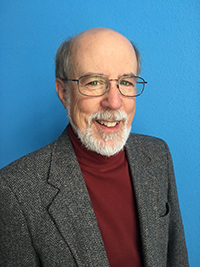
Corteva Agriscience, Agricultural Division of DowDuPont
David Onstad would like to be your next VP-elect for the Plant-Insect Ecosystems (P-IE) Section. I believe that the ESA is important, and I have enjoyed serving the Society in a variety of roles since 1992: (1) co-wrote guidelines for publishing papers about modeling in ESA journals, (2) served on the ESA North Central Branch Awards Committee, (3) co-founded and led the Quantitative Ecology Subsection of the ESA, (4) helped draft the ESA Position Statement on "Resistance Management for Genetically-Modified Crops," and (5) served as either main editor or subject editor of Environmental Entomology for more than 10 years.
My career as a professor (26 years in Illinois) and a research scientist in industry (6-plus years in Delaware and Iowa) has afforded me a perspective that I see as valuable for the P-IE section. Most of my work has focused on ecology and IPM. I enjoy the intellectual challenge of basic ecological questions, but what excites me the most is working to improve IPM. The subjects of my research have included (a) herbivores of alfalfa, apple, wheat, corn, soybean, broccoli, and forest trees; (b) bees, parasitoids, and predatory insects; and (c) diseases of insects. The second edition of my book, Insect Resistance Management: Biology, Economics and Prediction, was published in 2014.
I promise to work hard to continue the recent efforts to make the Section and the ESA relevant to scientists and the public. We are more than relevant; entomologists are critical to the well-being of society.
 Cesar Rodriguez-Saona
Cesar Rodriguez-Saona
Rutgers University
Dr. Cesar Rodriguez-Saona is a Professor and Extension Specialist in Blueberry/Cranberry IPM at Rutgers University. He received his M.S. degree from Oregon State University (1994) and his Ph.D. from the University of California, Riverside (1999). Prior to joining Rutgers University in 2005, he worked as a postdoc for the USDA-ARS (Phoenix, Arizona), University of Toronto, and Michigan State University.
Dr. Rodriguez-Saona's research goal is to develop new scientific knowledge regarding the effects of plant chemistry on the physiology and behavior of herbivores and their natural enemies. Integrating host-plant resistance traits and biological control can provide better understanding on insect-plant interactions and novel strategies for management of insect pests. His applied research focuses on the development and implementation of cost-effective reduced-risk IPM practices for blueberries and cranberries. He delivers current and critical IPM information to growers through his extension program. The specific areas of expertise within his research program include: host-plant resistance, insect-plant interactions, tritrophic interactions, biological control, integrated pest management, and insect chemical ecology.
Dr. Rodriguez-Saona has been an active member of the Entomological Society of America (ESA) since 1992. He frequently serves as judge in oral and poster student competitions at annual ESA and ESA Eastern Branch (EB) meetings, and he has also organized several symposia at these meetings. He has served as co-chair (2012) and chair (2013) of the EB program committee and as president of the EB in 2016-17. Dr. Rodriguez-Saona is an Editorial Board member for the Journal of Economic Entomology and Journal of Insect Science.
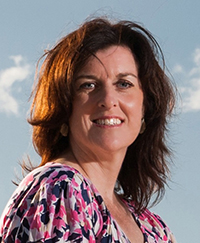 Helen Spafford
Helen Spafford
University of New Orleans
Helen Spafford is organized, dedicated, and a person of high integrity who leads by serving and seeks consensus in decision making. As an entomologist, she is interested in the ecology, behavior, and management of insect pests in a variety of systems, with a special fascination for weed and insect biological control, and she has collaborated with scientists from many institutions.
Helen is also a strong advocate for science, evidence-based policy and decision making. She has contributed to two ESA position statements and is proud to be an ESA Science Policy Fellow. Throughout her career, Helen has committed to promoting healthy, inclusive workplaces that support diversity, and she ran the #NeverOK campaign at the 2017 ESA Annual Meeting.
A committed teacher and student adviser, she has been recognized with teaching awards at two universities and by the Pacific Branch of the ESA. She has served as department chair and actively served her university and college communities on committees, served on the ESA membership committee, and assisted with organizing several conferences and workshops.
She earned her Ph.D. from Utah State University in 2000, following which she joined the faculty at the University of Western Australia and then the University of Hawaii, Manoa. She will soon begin a new role at the University of New Orleans. Helen has been a proud member of the Entomological Society of America since 1994 and looks forward to serving the society, its membership, and the science of entomology.
- Rob Morrison, USDA ARS Center for Grain and Animal Health Research, Manhattan, Kansas
- Sujaya Rao, University of Minnesota
- Melissa Willrich Siebert, Corteva Agriscience, Agricultural Division of DowDuPont
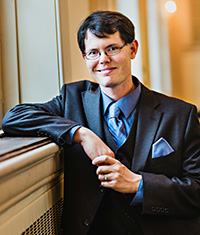 Rob Morrison
Rob Morrison
USDA ARS Center for Grain and Animal Health Research, Manhattan, Kansas
Dr. Rob Morrison is currently a Research Entomologist at the USDA-ARS Center for Grain and Animal Health Research in Manhattan, Kansas. He received his B.A. in biology from Kalamazoo College in 2006 and went on to earn his M.S. in ecology from the University of Munich in Germany in 2009. Rob earned his Ph.D. from the Department of Entomology at Michigan State University in 2014, where he researched the chemical ecology, biological control, and IPM of the asparagus miner.
Afterward, Dr. Morrison worked as a postdoctoral researcher at the USDA-ARS Appalachian Fruit Research Station, evaluating the behavior, chemical ecology, and biological control of the brown marmorated stink bug. Recently, he has been evaluating the chemical ecology, behavior, and IPM of stored product insects after harvest with the goal of increasing the sustainability of post-harvest agriculture.
Rob received the International Organisation for Biological Control's Early Career Outstanding Scientist Award and the Excellence in Early Career Award from ESA's Eastern Branch. Currently, Rob is serving as the Chair of the Early Career Professionals Committee and has served on 15-plus other ESA committees at the national, branch, and section level. This has also included the Diversity and Inclusion Committee, as well as the Awards Taskforce.
Rob is helping to organize the Plant-Insect Ecosystems (P-IE) Section Invasive Species Field Tour and currently serves as a subject editor for behavior at Environmental Entomology. Finally, he has acted as judge for 13 P-IE graduate student competitions and has organized 21 symposia at ESA meetings, including two program symposia and several P-IE section symposia.
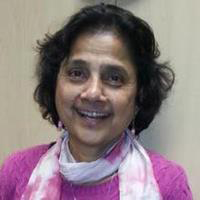 Sujaya Rao
Sujaya Rao
University of Minnesota
Sujaya Rao obtained a doctoral degree from the University of Minnesota and was a postdoctoral researcher at the University of Delaware and at the University of California, Berkeley. She worked as an extension advisor at UC Davis and as a research/teaching/extension professor at Oregon State University before moving back to her alma mater as the Entomology Department Head.
Over the years, Sujaya's research has focused on the behavioral and chemical ecology of plant-insect interactions in native and agricultural landscapes; she has gained expertise with both insect pests and pollinators and has received local, regional, and national awards for collaborative programs. Her "outside-the-box" educational programs have impacted graduate and undergraduate students, peers, the public, and K-12 students and teachers; these earned her the ESA Distinguished Achievement in Teaching Award and the Hodson Alumnus Award.
Sujaya's ESA leadership activities commenced with her participation on the Student Affairs Committee. Subsequently, she organized research and education-related symposia, served on diverse committees and as chair for ESA's Education and Youth Committee. For the Pacific Branch, Sujaya chaired the Linnaean Games, Student Competition, and Program Committees. As Pacific Branch President, she encouraged women to serve as leaders, and her innovative additions included the first-ever entomological texting competition! When elected as President of the Plant-Insect Ecosystems (P-IE) Section, she organized a symposium on "Effective Communication: How to Avoid Pie in Your Face!" to draw a broad audience.
If elected again, Sujaya will build on her many research, teaching, extension, outreach, and leadership experiences for representing the breadth in P-IE membership on the ESA Governing Board.
 Melissa Willrich Siebert
Melissa Willrich Siebert
Corteva Agriscience, Agricultural Division of DowDuPont
Melissa is the Global Entomology Program Leader for Corteva Agriscience, Agricultural Division of DowDuPont. She has held several roles within Dow AgroSciences following her graduate studies at Louisiana State University in 2004 and was awarded the inaugural "FlashPoint" award by Dow AgroSciences for outstanding contributions as an early career professional.
Melissa has demonstrated consistent leadership within entomology and ESA. She served as 2017 President for the Plant-Insect Ecosystems (P-IE) Section where, with her guidance, the Section developed a strategy and agenda to include the design and execution of a highly influential "Science Policy Field Tour on Pollinator Health," attended by scientists, agriculture producers, beekeepers, NGO professionals, and policy makers. In addition, she served as Chair of the ESA Publications Council, subject editor for the Journal Integrated Pest Management, P-IE Section Secretary, and President of the Mississippi Entomological Association. Melissa is currently an assistant editor for the Journal of Cotton Science.
Melissa's demonstrated broad influence and ability to accelerate action will be critical to expand the impact of the Section as a Governing Board representative. She is passionate about the role ESA and P-IE will play as an organizational platform for addressing entomology-related issues and grand challenges. As Governing Board representative, she will proactively seek member inputs and constructively address opportunities to expand the impact of P-IE and ESA in all relevant circles. The ESA exists to serve members, and Melissa has a solid track record in service to P-IE and ESA that has prepared her well to serve on the Governing Board.
- Carlos Josue Esquivel Palma, Department of Entomology, The Ohio State University
- Jessica Kansman, University of Missouri
- Ashley Leach, Cornell University
- Adrian Marshall, Washington State University
- Tyler Towles, Mississippi State University
- Anh K. Tran, University of Minnesota
 Carlos Josue Esquivel Palma
Carlos Josue Esquivel Palma
Department of Entomology, The Ohio State University
I am Carlos J. Esquivel, Ph.D. candidate at The Ohio State University. I would like to share my interest to continue as the Student Representative at the Plant-Insect Ecosystems (P-IE) Section Governing Council.
As part of the Governing Council, I have closely worked with all the members proposing, organizing, and supporting P-IE initiatives and activities. For instance, I was part of the team selecting the participants of the 2017 Science Policy Pollinator Field Tour. Furthermore, I actively participated selecting section symposia for the Annual ESA Meetings and representing the Section at the Student Affairs Committee.
I have taken leadership on activities beyond my responsibilities. I volunteered to analyze the P-IE 2017 Survey, where Section members provided their opinion about initiatives and future of the Section. Furthermore, in 2018 I proposed and launched the P-IE Student Symposium, an initiative intended to encourage student participation. Within the Society, I have been involved in other activities such as moderator/organizer of symposia, organizer of the student debates, and volunteer at the North Central Branch and national Annual Meetings since 2014.
I consider myself as an innate supporter of teamwork and collaboration. Therefore, if I am elected for a second term as P-IE Student Representative, I will continue my devotion and collaboration with all P-IE/ESA activities.
 Jessica Kansman
Jessica Kansman
University of Missouri
Jessica Kansman completed a B.S. in entomology at Michigan State University in 2015, where she conducted undergraduate research on chemical ecology and multitrophic interactions with Drs. Zsofia Szendrei and Jared Ali. She was awarded the Plant-Insect Ecosystems (P-IE) Section Undergraduate Achievement Award for that research, along with first place in the P-IE Ten-Minute Paper Competition at the 2015 National ESA meeting. In the fall of 2015, Jessica was awarded a research assistantship through the University of Missouri under the advising of Dr. Deborah Finke to pursue a Ph.D. in entomology.
Her research is focused on the effects of drought on aphid performance and feeding behavior and how subsequent changes in prey quality and abundance influence natural enemies and insect community interactions in field crops. Jessica has been very active as a member of the Society through serving on committees, organizing symposia, and volunteering at events. Currently, Jessica is the student representative to both the Professional and Honorary Awards Committee for the ESA North Central Branch, as well as the Representative to the Student Affairs Committee.
She has co-organized two symposia for the North Central Branch, and is assisting the current Students Affairs Rep to the Governing Council in organizing the first P-IE student symposium at the 2018 Joint Annual Meeting. She was also a volunteer at the P-IE networking session for ESA 2017 and participated in the Insect Expo at the International Congress of Entomology in 2016. Jessica is motivated to become more involved with P-IE and ESA at the national level.
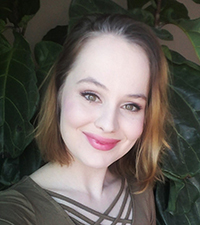 Ashley Leach
Ashley Leach
Cornell University
I am a Ph.D. candidate at Cornell University studying integrated pest management approaches to controlling onion thrips in onion. In my research program, I am particularly interested in host-plant resistance and cultural control techniques to manage insect pests and associated plant pathogens.
As a graduate student, I have been a member of several student organizations (e.g., Cornell university student groups SAGES and Jugatae) where I have participated both in supporting and leadership roles. As a member of SAGES, I chaired the scholarship and social committees and was also actively involved in creating professional development opportunities for graduate students, including CV and interview workshops. In 2016, I spearheaded an effort to create an annual inter-departmental event at Cornell's Geneva campus (NYSAES Research Symposium). This event provided the opportunity for graduate students to share their research with the community as well as collaborate with other agriculture departments, including plant pathology and horticulture.
Prior to graduate school, I was also very involved in community outreach and organized events with local conservation districts to promote agricultural education for residents of the community. In these leadership roles, I also collaborated with other local organizations (e.g., Farm Bureau) to create educational events for growers. If elected as the student representative, I would look forward to working with Plant-Insect Ecosystems Section officers to promote events within the section and represent the views of my fellow graduate students.
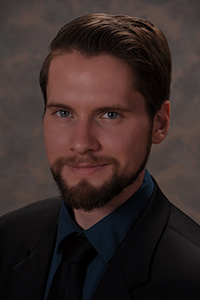 Adrian Marshall
Adrian Marshall
Washington State University
Adrian Marshall grew up exploring the outdoors of the Pacific Northwest, which fostered a fascination with insects. He has pursued this interest by first becoming a seasonal technician in an insect lab, leading to a B.S. in entomology from the University of Idaho, and he is now a Ph.D. candidate at the Washington State University Tree Fruit Research and Extension Center (WSU TFREC). The overall goal of Adrian's research is to develop and integrate mechanical exclusion practices for orchardists in North Central Washington.
Since starting his graduate career in 2015, Adrian has been highly involved in the Entomological Society of America, participating in oral and poster competitions, the texting competition, Linnaean Games, the Elevator Opportunity, Student Debates, and career fairs at three branch meetings and one national meeting. Adrian has also remained active in his department, despite being an off-campus student. He has served as secretary and currently is president of the WSU Entomology Graduate Student Association. He also co-established the Wenatchee Graduate Student Association at WSU TFREC, in which he served as vice president and president.
Through his involvement and offices held, Adrian has planned and implemented a variety of student-oriented activities, including public outreach events, invited international speakers, tours of research facilities, social gatherings, and professional development workshops. These experiences helped him develop a skillset for facing difficulties in encouraging students to be active and organizing events that meet their interests, which he intends to use to benefit ESA.
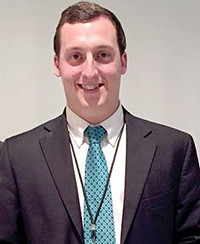
Mississippi State University
My name is Tyler Towles, and I am currently a graduate research assistant at Mississippi State University under the direction of Dr. Angus Catchot and Dr. Jeff Gore. I am currently working on a Ph.D. degree where I am observing the emergence of adult corn earworm and various corn refuge strategies; therefore, my graduate research project deals heavily with IPM components that coincide with the mission of the ESA Plant-Insect Ecosystems Section. Some of my responsibilities include trial rating, pest scouting, pesticide application, and aiding in fellow graduate student research.
I am originally from Greenville, Mississippi, where I developed a passion for entomology while working for Dow AgroSciences from 2011 to 2016. I currently serve as an ESA Southeastern Branch Student Representative and a member of the Linnaean Game committee. I also serve as the Mississippi Entomological Association student affairs chairman and Mississippi State University Department of Biochemistry, Molecular Biology, Entomology and Plant Pathology Student Representative. I have also served as president of the Mississippi State Entomology and Plant Pathology Club and was recently re-elected to my second term.
I attend numerous entomological meetings annually and present the results of my research project. I believe I could make great contributions to the position of Plant-Insect Ecosystems Governing Council Student Representative due to my hard work ethic, diligence, and ability to communicate with others. I enjoy reaching out and working with others to achieve goals, whether it be graduate student projects or Society efforts.

University of Minnesota
Anh K. Tran is a Ph.D. student at University of Minnesota (UMN), investigating two competing hypotheses on how the invasive vinegar fly, spotted-wing drosophila, survives in areas that experience seasonal climate changes—overwintering or long-distance migration. She received her M.S. in entomology in 2016 (UMN) working on conservation biological control of the soybean aphid and her B.A. in biology in 2011 (Hiram College). Prior to graduate school, Anh has contributed to molecular detection research for parasitoids of the soybean aphid. Additionally, Anh worked for an environmental consultation company releasing the biological control agent, the milfoil weevil, against Eurasian watermilfoil throughout the United States and Canada.
Anh joined ESA in 2013 and has been an active member, presenting and placing in student competitions at both the national and branch meetings, as well as participating in the Linnaean Games at NCB-ESA every year. This year she will be competing in the Student Debates at the Joint Annual Meeting. In Minnesota, Anh leads outreach events, teaching the public about the wonderful world of entomology, and is a pen-pal for Letters to a Pre-Scientist. Within her department, Anh has held multiple leadership positions (e.g., Vice President, Secretary, and Media Coordinator) for Frenatae, the UMN entomology graduate student organization.
At the college level, Anh has served on the Diversity & Inclusion Committee and has reviewed student travel grant applications. While Anh continues to be very engaged in her community, she is looking forward to becoming more involved with ESA by serving as the Plant-Insect Ecosystems Section Student Representative.
- Peter Asiimwe, Monsanto Company
- Donn T. Johnson, University of Arkansas
 Peter Asiimwe
Peter Asiimwe
Monsanto Company
Dr. Peter Asiimwe is the Insect Bioassay Lead in Monsanto's regulatory organization. In this role, Peter leads the team responsible for characterizing the functional activity of Monsanto's insect protection products to support environmental safety assessments. In addition, Peter is responsible for developing the environmental risk assessment strategy for insect protection products prior to global cultivation and import approval for commercialization. Peter also works cross-functionally to develop and refine processes for successful collection, analysis, and reporting of data supporting environmental risk assessment.
Prior to this, Peter was a postdoctoral research associate at the University of Arizona, where he conducted studies to understand the influence of a maternally inherited symbiont on the invasiveness of whiteflies in cotton. Peter graduated with his Ph.D. in entomology from the University of Arizona, where his research focused on understanding the relative impacts of plant quality and biological control on the integrated pest management of whiteflies and Lygus in cotton.
Peter also worked at the International Institute of Tropical Agriculture, where he focused on evaluating biological control options for whiteflies, which transmit the devastating cassava mosaic and cassava brown streak viruses in East Africa. Peter has authored or co-authored more than 10 peer-reviewed and extension publications.
 Donn T. Johnson
Donn T. Johnson
University of Arkansas
Dr. Donn T. Johnson is interested in representing the Plant-Insect Ecosystems Section on the ESA editorial board for American Entomologist. Donn is a professor of entomology at the University of Arkansas. He received a B.S. in biology from the University of Minnesota-Duluth and a Master's in 1976 and Ph.D. in 1978 in fruit entomology from Michigan State University. Since 2014, he has served as Section L (Laboratory Bioassay) editor of ESA's Arthropod Management Tests.
He has 131 publications, 675 citations, and a ResearchGate score of 29.75. He is a research and extension entomologist of fruits, nuts, and rice who develops and implements fruit and nut scouting methods and pest management programs for conventional, organic, and high-tunnel production systems. Donn received the 2002 University of Arkansas John White Grape Team Award and the 2007 ESA Southeastern Branch Award for Excellence in Integrated Pest Management. He has taught Insect Behavior and Chemical Ecology and Insect Pest Management.
- Fiona L. Goggin, University of Arkansas
- Jessica Hartshorn, Minnesota Department of Natural Resources/Clemson University
- Xiao-Yue Hong, Nanjing Agricultural University, China
- Fred R. Musser, Mississippi State University
- Punya Nachappa, Purdue University Fort Wayne
- Arash Rashed, University of Idaho
- Zsofia Szendrei, Michigan State University
 Fiona L. Goggin
Fiona L. Goggin
University of Arkansas
Fiona L. Goggin received a B.S. in plant science from Cornell University and a Ph.D. in entomology from the University of California, Davis. She is a full professor of entomology at the University of Arkansas, where she has been a faculty member since 2001. Her research focuses on plant-insect interactions and host-plant resistance to aphids, and she teaches Insect Physiology and Molecular Biology. She is on the leadership team of the Plant Imaging Consortium, which applies cutting-edge technologies to study crop stresses such as insect infestations, disease, and abiotic stresses.
Dr. Goggin has published 33 peer-reviewed articles, one book chapter, and nine other publications and is the recipient of the 2001 ESA Starks Plant Resistance to Insects Research Award and the 2014 ESA Southeastern Branch (SEB) Recognition Award in Insect Physiology, Biochemistry and Toxicology. She has organized one program symposium, one Plant-Insect Ecosystems (P-IE) Section symposium, and one member symposium for ESA's annual meetings; judged P-IE student presentations; and served as a member of the Entomological Foundation, the SEB membership committee, the SEB member awards committee, and the ESA Starks Plant Resistance to Insects Research Award judging committee.
Dr. Goggin has also served as a panel manager for the U.S. Department of Agriculture's National Institute of Food and Agriculture and a panelist for USDA and the National Science Foundation, edited a special issue on plant resistance for Current Opinion in Insect Science, and served on the editorial board of the Journal of Chemical Ecology. Her expertise is highly relevant to Environmental Entomology's focus on insects' interactions with biological, chemical, and physical aspects of their environment.
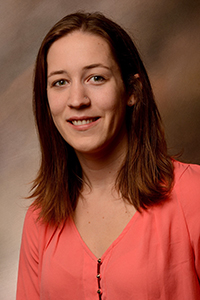 Jessica Hartshorn
Jessica Hartshorn
Minnesota Department of Natural Resources/Clemson University
Jessica Hartshorn is currently a Forest Health Specialist with the Minnesota Department of Natural Resources and will soon be moving to Clemson University to fill the role of Assistant Professor of Forest Health beginning in August 2018. Jessica received her M.S. (2012) and Ph.D. (2016) in entomology from the University of Arkansas with an emphasis in forest ecology.
As a forest health specialist, Jess surveys the state's forest resources for insect and disease issues and provides management recommendations and professional training, and she works with university faculty to conduct research. Her work is interdisciplinary and investigates ecologically sound management of insects and diseases in forested settings.
She was recognized as outstanding Ph.D. student by the ESA Comstock Award in 2015, the Roger F. Anderson Award (Southern Forest Insect Work Conference, 2014), and by the University of Arkansas College of Agriculture Distinguished Ph.D. Scholar Award (2016). She is active in service and leadership in ESA and other professional societies.
As a graduate student, Jessica organized and moderated symposia at branch and national ESA meetings and was a member and chair of the Southeastern Branch Student Affairs Committee. As a professional she has organized member and section symposia and acted as moderator and judge for several student paper and poster sessions as well as student debates. She has both published with, and served as a reviewer for, Environmental Entomology, and she looks forward to bringing a fresh perspective to the editorial board, learning more about the publication process within ESA, and serving the ESA community.
 Xiao-Yue Hong
Xiao-Yue Hong
Nanjing Agricultural University, China
Xiao-Yue Hong is vice president of the Entomological Society of China and a member of ESA. He has been doing research on endosymbiont and population genetics for many years and has published more than 200 papers in peer-reviewed international journals.
He has served on the editorial board of several international entomological journals, such as Bulletin of Entomological Research, Applied Entomology and Zoology, Scientific Reports, International Journal of Acarology, Systematic and Applied Acarology, and PLOS One.
He is full of experience of handling and reviewing academic papers and is willing to join the editorial board of one ESA journal.
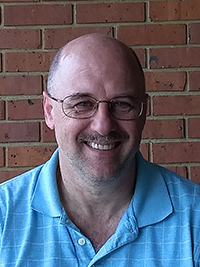 Fred R. Musser
Fred R. Musser
Mississippi State University
Fred is a professor at Mississippi State University, researching and teaching in the area of integrated pest management. He has been an author on more than 50 refereed publications and teaches "Principles of Insect Pest Management" and "Field Crop Insects" annually. His research focuses in the areas of threshold development, sampling methods, and resistance management for pests of soybean, cotton, corn, and sweet potato.
He has been a member of ESA since 1999, joining when he was a graduate student at Cornell University. Previous service to ESA has included being a member of the Plant-Insect Ecosystems Section Governing Council (2013-17), including being president of the section (2015-16); serving as local arrangements chair for the 2015 Southeastern Branch meeting; service on the editorial board of the Journal of Economic Entomology (2009-2013); as well as moderating and judging presentations at numerous meetings and reviewing manuscripts for several ESA journals.
In addition to his service to ESA, Fred is treasurer of the Mississippi Entomological Association, treasurer of the Christian Faculty and Staff Forum at Mississippi State, and a senator in the Mississippi State University Faculty Senate.
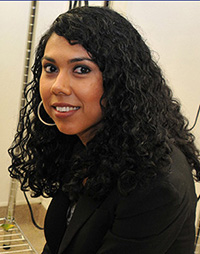 Punya Nachappa
Punya Nachappa
Purdue University Fort Wayne
Please accept my self-nomination to the Environmental Entomology Editorial Board. I obtained my M.S. in entomology from the University of Georgia and Ph.D. in entomology from Kansas State University. After completing my Ph.D., I was a postdoctoral research associate at Kansas State and then moved onto another postdoctoral position at Texas A&M University. Currently, I am an associate professor at Purdue University, Fort Wayne, but I will be moving to Colorado State University starting in the fall of 2018.
My area of interests are insect vector biology, insect behavior, insect molecular biology, and pest management. My research seeks to understand outcomes and mechanisms underlying the interactions between plants, pathogens, and insect vectors. I am specifically interested in understanding these complex interactions as a means of managing plant pests and diseases. Over the course of my career, I have published 19 papers in international peer-reviewed journals including Environmental Entomology and the Journal of Economic Entomology. I have obtained over $1 million in extramural funding as PI and co-PI. My students and I have given over 20 presentations at regional and annual ESA meetings, where they were awarded President's Prize for outstanding research several times.
I have been a member of the ESA ever since I came to the United States as a student. I have been both presenter and organizer at the regional and annual ESA meetings and have reviewed numerous manuscripts for ESA journals. I hope to continue and expand my contribution to ESA as member of the Environmental Entomology Editorial Board.
 Arash Rashed
Arash Rashed
University of Idaho
I have completed my Bachelor's and Master's degrees in entomology and my Ph.D. in biology. Following my graduation in 2006, I continued my research as a postdoctoral fellow at the University of Cincinnati, University of California-Berkeley, as well as Texas A&M AgriLife Research. For nearly a decade, my research has been primarily focused on vector-borne plant pathogen complexes. Currently, I am an assistant professor at the University of Idaho, Department of Entomology, Plant Pathology and Nematology, in Moscow, Idaho.
In my current position, in addition to my research in insect-transmitted bacteria and viruses, I am also working on evaluating the efficacy of biological and cultural approaches to manage wireworms in cereal crops. I currently have two graduate students involved in my research program, which is supported through federal, state, as well as private industry sources of funding.
I have extensive experience in publishing both research and extension articles. Throughout my career, in addition to publishing numerous peer-reviewed papers, I have also served as scientific reviewer for more than 20 journals. I have been an associate editor of PLOS One since 2014. Provided my experience as a researcher, an author, a reviewer, and an editor, I believe that I can be an effective representative for the Plant-Insect Ecosystems Section on the Editorial Board of Environmental Entomology.
 Zsofia Szendrei
Zsofia Szendrei
Michigan State University
I received my Ph.D. in entomology from Michigan State University (MSU) in 2005. In 2009, I was hired by the MSU Entomology Department into a tenure-track position, where I currently am an associate professor with a 50 percent extension, 30 percent research, and 20 percent teaching appointment.
My research focuses on the ecology and management of arthropods that occur in vegetable production. Research themes include chemical ecology, biological control, habitat management, and behavioral pest management. The methods we use range all the way from the field to the molecular lab.
I have been a subject editor for Environmental Entomology since 2015, editing manuscripts in population ecology and biological control.
- Don Henne, Lakehead University Faculty of Natural Resources Management
- Nicholas Chirivas Manoukis, United States Department of Agriculture-Agricultural Research Service
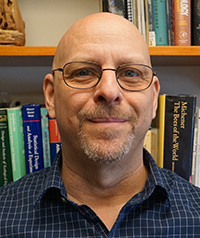 Don Henne
Don Henne
Lakehead University Faculty of Natural Resources Management
Dr. Don Henne is currently assistant professor of forest entomology at Lakehead University in Thunder Bay, Ontario, Canada. He has a B.S. in agriculture (majoring in entomology) and a M.S. in entomology from the University of Manitoba and a Ph.D. in entomology from Louisiana State University.
Dr. Henne has previously worked on biological control of invasive insects and weeds, host-parasitoid interactions, ecologically-based pest management of corn pests in Hawaii, plant disease-vector interactions, plant disease epidemiology, and population ecology of fire ant parasitoids. Dr. Henne is currently interested in boreal and Great Lakes forest insect biodiversity (particularly ants and bees), saproxylic insects, spatial and temporal dynamics and distributions of insect populations, and biology and ecology of oakworms (Anisota) and mapleworms (Dryocampa).
A member of ESA since 1997, Dr. Henne has served on various ESA committees, including panel judge member of the ESA Distinguished Achievement Award in Horticultural Entomology and chair of the ESA Southwestern Branch Audit Committee, and has organized and moderated several ESA symposia. Dr. Henne was one of several recipients of the 2012 ESA Integrated Pest Management Team Award.
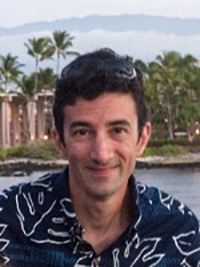 Nicholas Chirivas Manoukis
Nicholas Chirivas Manoukis
United States Department of Agriculture-Agricultural Research Service
Nicholas Manoukis is a supervisory research biologist with the USDA-ARS in Hilo, Hawaii. His research is focused on the ecology and behavior of tephritid fruit flies and other invasive pests such as the coffee berry borer. Work in his laboratory includes computational and field components.
Prior to joining ARS in 2010, Dr. Manoukis spent almost a decade studying the ecology, evolution, and mating behavior of the malaria vector Anopheles gambiae in Mali, West Africa, first as a graduate student at UCLA then as a postdoc at the National Institutes of Health. Early research included studies on bats, amphibians, fish, and costal snails. Dr. Manoukis was a fifth grade bilingual teacher in the Long Beach, California public schools. He was raised in Rio de Janeiro, Brazil.
SysEB Elections
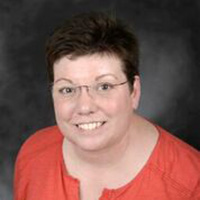 Rebecca (Becky) Simmons
Rebecca (Becky) Simmons
University of North Dakota
Dr. Rebecca (Becky) Simmons earned her Ph.D. in entomology from the University of Minnesota Twin Cities and is currently an associate professor of biology at the University of North Dakota in Grand Forks, North Dakota. Becky's research involves the systematics of tiger moths, the evolution of complex traits, molecular identification of pollinator communities in the Northern Great Plains and inclusion of underrepresented groups in STEM disciplines. She was a recipient of the Snodgrass Memorial Research Award for her dissertation work.
Becky served as treasurer for the Systematics, Evolution, and Biodiversity Section from 2008 to 2011, the Presidential Committee on the ESA Website in 2010, a member of the editorial board for the Journal of Integrated Pest Management from 2009 to 2014, and the Presidential Task Force for Volunteers in 2017. She also was a judge for the National Linnaean Games from 2015 to 2016, as well as a judge for student competitions and session moderator at national and regional meetings. She has co-organized two symposia for the International Congress of Entomology (2004, 2016), as well as one symposium for the annual meeting (2005).
- Carol von Dohlen, Utah State University
- John T. (Jack) Longino, University of Utah
 Carol von Dohlen
Carol von Dohlen
Utah State University
Carol von Dohlen received her A.B. from Dartmouth College and her M.S. and Ph.D. from the University of Maryland, College Park, and she did postdoctoral work at the University of Arizona. She is currently Professor in the Department of Biology, Utah State University (since 1996), where she also serves as Assistant Department Head and Director of the USU Insect Collection.
Although she started her graduate studies on birds, she quickly realized that insects were easier to sample and has been enjoying working on them ever since. Her areas of research interest are molecular phylogenetics and evolution of insects—mostly the sap suckers, but with forays into Diptera, Odonata, and Pompilidae—and genomics and evolution of bacterial endosymbionts in Sternorrhyncha.
She has advised 10 Ph.D. and three M.S. students and served on committees of many others. She teaches courses in insect systematics, phylogenetics, evolution, biogeography, and other graduate seminar topics. She has been a member of ESA since the end of the last century, and previously served ESA as Secretary-to-Chair of the former Section A. She currently serves as subject editor for ESA's Insect Systematics and Diversity.

University of Utah
Jack Longino is a Professor of Biology at the University of Utah. He is a specialist in tropical insect diversity and for over 25 years has coordinated large-scale biodiversity inventory projects in Central America. His research focus is on the taxonomy and ecology of Neotropical ants, and he was an early promoter of web-based dissemination of biodiversity data.
He has been subject editor for Formicidae with the journal Zootaxa for 15 years. In 2006, he was awarded the E. O. Wilson Naturalist Award from the American Society of Naturalists. Leadership roles include three years as Associate Chair of the Department of Biology. He holds a Ph.D. from The University of Texas, Austin, and a B.S. from Duke University.
Eastern Branch Elections
 Tracy C. Leskey
Tracy C. Leskey
USDA-ARS, Appalachian Fruit Research Station, Kearneysville, West Virginia
Tracy Leskey holds a Ph.D. degree in entomology from the University of Massachusetts at Amherst, Massachusetts; a M.S. degree in ecology from the Pennsylvania State University, University Park, Pennsylvania; and a B.S .degree from Wilson College, Chambersburg, Pennsylvania. She has been employed by the USDA-ARS, AFRS, in Kearneysville as a Research Entomologist and as Laboratory Director. Her research has focused on development of behaviorally based management tools for invasive and native pests of fruit crops.
She has published over 100 peer-reviewed journal articles, two patents, and over 40 other publications including book chapters and proceeding articles. She served as a liaison to the House Agricultural Appropriations Committee, providing numerous updates on the pest status of and research progress on the invasive brown marmorated stink bug. She has supervised numerous postdocs and graduate students.
Dr. Leskey has been interviewed by The New York Times, The Washington Post, and NPR and appeared live on Fox News and C-SPAN and has done several stories with National Geographic. As the lead Project Director, she has secured over $14 million in extramural funding. She is a Subject Editor for Environmental Entomology, a member of the Entomological Society of America Special Committee on Governance, and past president of the ESA Eastern Branch.
 Nancy Troyano
Nancy Troyano
Rentokil North America
After receiving her Ph.D. in entomology from Virginia Tech in 2009, Nancy M. Troyano began working for Rentokil North America as Pest Specialist in Hatfield, Pennsylvania. In May 2010, Nancy assumed the role of Training Manager/Entomologist, and has since been promoted to the Director of Technical Education and Training for North America.
Nancy's current responsibilities include:
- Leading and supporting technical education and training for North America.
- Development of training materials and programs for new Pest Specialists (technicians), including a comprehensive academic curriculum as well as a structured on-the-job training program.
- Development of monthly continuing education materials and programs to fulfill state pesticide applicator licensing requirements for all Pest Specialists and Managers.
- Course development in Entomology and Pest Management—utilized globally by Rentokil.
- Ongoing technical support to field operations.
- Subject matter expert for mosquito management and vector-borne disease programs.
- Invited speaker on pests and pest management topics to customers and at industry events, community-education forums, etc.
International Branch Elections
- Mustapha Debboun, Director, Harris County Public Health, Houston, Texas
- Rodrigo Diaz, Louisiana State University
- Thomas J. Simonsen, Natural History Museum Aarhus, Denmark
 Mustapha Debboun
Mustapha Debboun
Director, Harris County Public Health, Houston, Texas
Colonel (Ret.) Dr. Mustapha Debboun is a medical and veterinary entomologist who is currently the Director of Mosquito & Vector Control Division in Harris County Public Health in Houston, Texas. He earned his B.A. in cellular and molecular biology from Skidmore College, M.S. in medical entomology from the University of New Hampshire, and Ph.D. in medical and veterinary entomology from the University of Missouri-Columbia.
He has worked in military public health entomology, vector-borne diseases, integrated pest management operations, and research and development of arthropod repellents. This work has taken him to over 35 countries in Africa, Asia, Australia, Europe, and South America. His main goal is the integration of medical entomology with other operational public health fields to provide efficient and sustainable management of disease vectors and personal protection from the vector-borne disease threat.
He is the current Medical, Urban, and Veterinary Entomology Section President and has served as Director of ESA Certification Board Program, Chair of the Journal of Medical Entomology Editorial Board, Chair of ESA's International Affairs Committee, and an ad hoc ESA BCE military liaison to promote and recruit new members for ESA's Certification Program within the Armed Forces. He has authored or co-authored over 100 peer-reviewed publications and three books: Insect Repellents: Principles, Methods and Uses; Prevention of Bug Bites, Stings, and Disease; and Insect Repellents Handbook.
He also organizes ESA symposia, serves on eight journal editorial review boards, a reviewer for six peer-reviewed journals. His professional ESA Awards include the Distinguished Service Award to the ESA Certification Program and ESA Fellow.
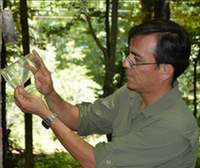 Rodrigo Diaz
Rodrigo Diaz
Louisiana State University
Dr. Rodrigo Diaz is an Assistant Professor in the Department of Entomology at Louisiana State University. Rodrigo's research focuses on biological control of non-native weeds and insects. Current projects include biological control of giant salvinia, emerald ash borer, Roseau cane scale, and air potato.
Due to his experience in classical biological control, Rodrigo has developed a network of international partnerships that have resulted in several research agreements, procurements of import/export permits, student exchanges, and scientific publications. Current projects include cooperation with scientists from universities or government agencies from Uruguay, Argentina, Colombia, South Africa, Iran, Australia, and China.
Rodrigo is native of Quito, Ecuador, and obtained his B.S. in Agriculture from Zamorano University in Honduras. During his undergraduate studies, he specialized in crop protection and worked on biological control of corn earworm using commercially available Trichogramma parasitoids. To pursue his career in entomology, he moved to the U.S. and conducted an internship in weed biological control at the University of Illinois. Then, Rodrigo obtained his master's degree at Texas A&M University in 2003 and his Ph.D. at the University of Florida in 2008.
Rodrigo has been a member of the Entomological Society of America since 2001 and has organized and participated in several ESA branch meetings, multistate research program symposia, and international meetings. His experience in overseas projects and more than 17 years as ESA member would strengthen the International Branch of ESA. Rodrigo lives in Baton Rouge with his wife Veronica and son Nicolas.
 Thomas J. Simonsen
Thomas J. Simonsen
Natural History Museum Aarhus, Denmark
Thomas J. Simonsen received his Ph.D. (thesis on phylogenetics and evolution of fritillary butterflies) from the University of Copenhagen, Denmark, in 2004. He was a postdoc at the University of Alberta, Edmonton, from 2005 to 2009. From 2009 to 2015 he was a research entomologist at the Natural History Museum, London, United Kingdom. In 2015 he moved back to Denmark to take up a position at the Natural History Museum Aarhus where he is currently a Senior Researcher and Curator of the entomology collections and the collections of amber inclusions, as well as serving as the employees' representative on the museum's governing board.
His main research interests are insect systematics, evolution, morphology, biogeography, and diversity with focus on Lepidoptera, Diptera, and Odonata. His current research foci cover apha taxonomy; Quaternary biogeography and phylogeography of Northern Hemisphere insects with reference to the effects of the glaciations and past climatic changes, as well as more recent anthropogenic activities; general effects of climate changes and landscape changes on insect diversity; and insect palaeontology centred on the unique early Pliocene fossil deposits in northern Denmark.
Thomas has a long history of international collaborations and scientific citizenship engagements: He has previously served as vice-president of the North American Lepidopterists' Society and is currently vice-president of the SEL (Societas Europaea Lepidopterologica) as well as editor of Systematic Entomology.
- Muhammad Mazhar Ayaz, Entomology and Chemotherapy, Department of Pathobiology, Faculty of Veterinary Sciences, Bahauddin Zakariya University, Multan
- Rupesh Kariyat, University of Texas Rio Grande Valley
- Megha N. Parajulee, Texas A&M University
- Julien Saguez, CÉROM, Centre de Recherche sur les grains, Inc., Québec, Canada
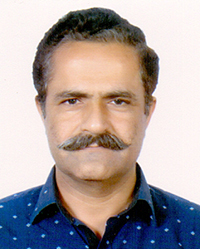 Muhammad Mazhar Ayaz
Muhammad Mazhar Ayaz
Entomology and Chemotherapy, Department of Pathobiology, Faculty of Veterinary Sciences, Bahauddin Zakariya University, Multan
Dr. Muhammad Mazhar Ayaz has received his Ph.D. in veterinary parasitology from University of Agriculture Faisalabad in 2003; AMBO certificate from Riken Institute, Saitama, Japan; and Special Diagnostic Training from VRI Lanzhou, China; Advanced Molecular diagnostics from NIBGE, Pakistan; and ParsCo from University of Bari, Italy.
Currently, he is working as Assistant Professor in the Laboratory of Parasitic Chemotherapy and Vector-Borne Disease, Parasitology Section, at Faculty of Veterinary Sciences, Bahauddin Zakariya University (BZU), Multan, Pakistan. He has successfully completed his administrative responsibilities as member of the faculty board.
His research has included immunology, protozoology, biotechnology for parasites, haemo-protozoans, and helminthes in large and small ruminants. Based on this research and fellowship training, he has received several awards and honors, such as Star Asia Award, Mem. R.E.S (London), Fellow ParsCo (Italy), and Country Representative (CR) of International Goat Association (IGA).
He is serving as an editorial member or editor of several international, reputed impact-factor and non-impact factor journals. He has authored more than 80 research articles and 12 books and laboratory manuals. He is a member of several national and international societies/bodies including ASTMH, IGA, Royal Entomological Society (London), RSTMH, Entomological Society of America (ESA), and Pakistan Society of Parasitologists. He authored a book chapter in Goat Science ISBN 978-953-51-5495-2 (Intech Publisher).
 Rupesh Kariyat
Rupesh Kariyat
University of Texas Rio Grande Valley
I am Dr. Rupesh Kariyat, and I am an Assistant Professor of Entomology in the Biology Department of the University of Texas Rio Grande Valley (UTRGV). I teach undergraduate and graduate level courses in entomology and ecology and conduct research on chemical ecology of herbivore-pollinator interactions in domesticated and natural ecosystems.
I am originally from India and moved to the United States after completing my B.S. in agricultural sciences. My graduate work was focused on pollination biology in alfalfa (M.S., University of Wyoming), and plant-herbivore interactions in weeds (Ph.D., Pennsylvania State University). I then moved to Switzerland (ETH Zurich) as a postdoctoral scholar in the laboratory of Consuelo De Moraes and continued work on insect-plant interactions, focusing on plant defense and herbivore counter defenses.
I have been an ESA member since graduate school and have given talks at national and branch meetings, organized and participated in symposia, and received awards and program enhancement funds. In addition to contributing through my scholarship, I have also been involved with ESA educational and outreach activities, and at UTRGV I have recently received an internal grant to kickstart an insect collection.
I believe that I truly fit with the objectives of the International Branch, since I have studied and trained in Asia, the United States, and Europe and continue to work with collaborators in many countries. I also believe that my serving on the Governing Board will open up more opportunities for students at UTRGV—a primarily Hispanic-serving institution in South Texas.

Texas A&M University
Dr. Megha Parajulee earned his Ph.D. in Entomology from the University of Wisconsin-Madison and then joined Texas A&M University (TAMU) as a cotton entomologist in 1994. Dr. Parajulee is currently a Professor, Faculty Fellow, and Regents Fellow. His research focuses on developing ecologically intensive arthropod management in Texas cotton.
Dr. Parajulee is a leader in cotton entomology research, teaching, and service, with an exemplary record of scientific research, publication, and delivery of pest management technologies to producer clientele. His scientific contributions include 100 refereed and more than 380 non-refereed publications, 150 invited and 260 submitted papers, and plenary/keynote presentations in 16 countries. He has received the TAMU Vice Chancellor's Research Excellence Award, Regents Fellow Award, and Team Research Excellence Award.
Dr. Parajulee has served as ESA National Program Chair (2010), International Affairs Committee Chair (2008), Society of Southwestern Entomologists President (2009), and ESA-International Branch President (2017). He was also a Fulbright Senior Fellow in Nepal and Uzbekistan.
As a candidate for Governing Board, Dr. Parajulee believes in the International Branch's stated purpose of "promoting entomology for the advancement of science and the benefit of society through scientific and professional communications, outreach on science and public policy, program development, continuing education, and fostering interest in entomology." Dr. Parajulee recognizes that the key advantages of the Branch include its diverse membership, substantial audience, and vast territory. Thus, Dr. Parajulee plans to focus on increasing the visibility and outreach of the Branch to the global entomological audience to promote and further ESA interests.
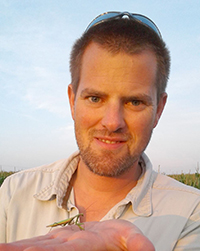 Julien Saguez
Julien Saguez
CÉROM, Centre de Recherche sur les grains, Inc., Québec, Canada
Dr. Julien Saguez completed his Ph.D. in France in 2007. From 2008-2015, he joined Dr. Charles Vincent's laboratory (Agriculture and Agri-Food Canada) as a two-year postdoc and then as a research assistant. He studied the tritrophic interactions between leafhoppers, grapevines, and phytoplasmas. In 2015, Julien joined the CÉROM (Centre de Recherche sur les grains). He develops projects on different field crop pests and conducts projects on invasive pests associated with corn and soybean in a context of climate change. He is also involved into the provincial Pest Monitoring Network.
Julien introduced and advanced the use of electropenetrography (EPG) technique in Canada to conduct studies on the feeding behaviour of leafhoppers and aphids.
Julien has produced several scientific communications—two patents, 21 peer-reviewed scientific papers, five book chapters, five technical bulletins and guides, 10 non-peer-reviewed papers, 10 conferences proceedings, 38 oral presentations, and 47 posters—and has presented in provincial, national, and international meetings.
Since 2008, Julien has promoted entomology to the community, visiting schools and giving courses. More than 4,000 young students have been initiated to entomology.
Julien is member of three entomological societies: SEQ (Québec), ESC (Canada), and ESA (America, Plant-Insect Ecosystems and International Branch member). From 2014 to 2017, Julien was member of the executive committee of the SEQ (president in 2015-2016). In 2015, he was involved in the organizing committee of the ESC-SEQ Joint Annual Meeting. In 2016, at the ICE, he co-chaired a symposium and, in 2018, he will co-organize a symposium for the ESA, ESC, and ESBC Joint Annual Meeting.
Southwestern Branch Elections
- Elizabeth "Wizzie" Brown, Texas A&M AgriLife Extension Service
- Alvaro Romero, New Mexico State University
 Elizabeth "Wizzie" Brown
Elizabeth "Wizzie" Brown
Texas A&M AgriLife Extension Service
Wizzie Brown is an Extension Program Specialist-Urban IPM in Austin, Texas. Her research interests include red imported fire ants, bed bugs, and termites. Wizzie is a Board Certified Entomologist with a specialty in Urban Entomology. She holds a non-commercial license from the Texas Structural Pest Control Service. She was part of the arbovirus team that won the Southern Region IPM Pulling Together Team Award and the Texas A&M AgriLife Extension Superior Service Team Award in 2017. In 2016, she won the Advisors Team Award from the Texas Master Naturalists. Her team won the Texas A&M AgriLife Extension Superior Service Team Award for School IPM in 2015.
Wizzie served as President of the Society of Southwestern Entomologists (2017). She has participated in local arrangements to organize three meetings; two regional (ESA Southwestern Branch, Chair, 2006 and 2017) and one international (International Meeting on Imported Fire Ants, 2011). She was Program Vice-Chair (2017) for the ESA Southwestern Branch meeting and is currently Program Chair. She has served on the Southwestern Branch's Insect Expo and Youth Science committees since 2010.
She joined the BCE ad hoc committee for reviewing the core exam and served on the BCE certification awards panel from 2014 to 2016. Wizzie has served as Chair (2009) and Vice-Chair (2008) for the Committee on Education and Outreach for ESA. She served as a member of the BioQuip Undergraduate Scholarship committee from 2008 to 2011 and was Chair of the Evaluation Committee for the Stan Beck Fellowship from 2011 to 2012.

New Mexico State University
Alvaro Romero is Assistant Professor of Urban Entomology at New Mexico State University in Las Cruces. Romero has a Doctor of Veterinary Medicine degree from the National University of Colombia, a M.Sc. in Veterinary Entomology from Kansas State University, and a Ph. D. in Urban Entomology from the University of Kentucky. He established in 2012 the NMSU Urban Entomology Research Center in Las Cruces, and his research focuses on bed bugs, kissing bugs, Turkestan cockroaches, and fleas.
He has studied bed bugs since their resurgence, particularly insecticide resistance, the impact of insecticides on bed bug behavior, and development of integrated management tactics for this pest. He serves as a graduate selection committee member and student advisor in the Entomology, Plant Pathology, and Weed Science and a graduate committee member in the Biology Graduate Program.
Romero is subject editor for the Journal of Integrated Pest Management and a symposium organizer, meeting moderator, and student competition judge for the Entomological Society of America Annual meetings. He also actively participates in the organization of the National Conference in Urban Entomology. He has reviewed manuscripts for 10 journals and, since 2012, has served as an ad hoc member of the EPA-FIFRA Scientific Advisory Panel to review issues related to methods for efficacy testing of bed bug pesticide products. Romero is currently participating in a multistate Bed Bug Work Group funded by USDA Western IPM Center with the project "Baseline Data Regarding Regional Bed Bug Management Practices, Challenges, and Research Needs."
- Robert W. Davis, BASF Professional & Specialty Solutions
- Ali A. Zarrabi, Oklahoma State University
 Robert W. Davis
Robert W. Davis
BASF Professional & Specialty Solutions
Dr. Bob Davis has a varied employment background. Positions have included Fisheries Biologist, Pest Control Operator, Pest Control Technician, Extension Research Specialist, Graduate Research Assistant, Technical Director for ABC Pest & Lawn Services of Austin, Texas, and Technical Field Representative for Aventis and Bayer Environmental Sciences. Bob is presently employed as a Technical Services Representative for BASF Professional & Specialty Solutions.
Bob received his educational degrees from the University of Nebraska-Lincoln (UNL). At UNL he received a B.S. degree in natural resources and his M.S. and Ph.D. from UNL. He is a Board Certified Entomologist and is active in the Entomological Society of America. His graduate work was focused on testing and evaluating termite control materials and techniques. Bob has multiple publications in peer-reviewed journals and has provided educational materials and articles through extension and professional magazine venues. He has provided many and varied educational and research presentations in our industry for over 25 years.
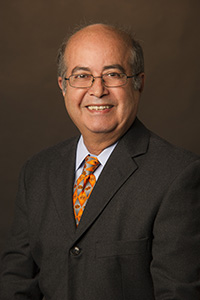 Ali A. Zarrabi
Ali A. Zarrabi
Oklahoma State University
Ali Zarrabi is a faculty member with Entomology and Plant Pathology at Oklahoma State University. He received a B.S. degree in agriculture from Hamadan Agricultural College in Iran and an M.S. in crop science and Ph.D. in plant breeding and genetics from Oklahoma State University. He has been active in the area of aphid ecology and impact of insects in Oklahoma ecosystems. His major focus is on host-plant resistance evaluation programs on aphids in wheat, canola, soybean, sorghum, and alfalfa. He also has been involved in insecticide efficacy and sampling in row crops. Dr. Zarrabi has more than 35 years of experience at Oklahoma State University in field, greenhouse, and laboratory projects. Since arrival of sugarcane aphid (SCA) in Oklahoma in 2013, he has been involved in continued SCA management research projects to improve productivity and yield through insecticide evaluation and genetic improvement.
- Jesus F. Esquivel, USDA-ARS Insect Control and Cotton Disease Research Unit
- Micky D. Eubanks, Texas A&M University
 Jesus F. Esquivel
Jesus F. Esquivel
USDA-ARS Insect Control and Cotton Disease Research Unit
Dr. Jesus Esquivel is a Research Entomologist with the Insect Control and Cotton Disease Research Unit (USDA-ARS) in College Station, Texas. He has been a member of the Southwestern Branch (SWB) of the ESA for 25 years. Dr. Esquivel actively serves the branch, section, and national levels of the ESA. He has served on SWB's governance as Past President (2014-15), President (2013-14), Vice President (2012-2013), and Secretary/Treasurer (2011-12).
Additionally, he has served as chair and member of multiple SWB Committees, including Awards & Honors, Linnaean Games, Membership, Nominating, Program, and Site Selection Committees. At the national level, Dr. Esquivel has served as chair or member on numerous ESA committees, including Annual Meeting Program Committee (Program Co-Chair, 2015-16; Poster Co-Chair, 2016-17; Student Competition Co-Chair, 2014-15). He further served on the Organizing Committee for the 2016 International Congress of Entomology, which was by far the largest gathering of entomologists in history.
Moreover, Dr. Esquivel has been active within the Plant-Insect Ecosystems (P-IE) Section of ESA; he served as Representative for P-IE on the Awards & Honors Committee (2011-14). Similarly, he served as the SWB Representative to Awards & Honors Committee and Membership Committee at the national level. Dr. Esquivel is a current member of the Board of Counselors for the Entomological Foundation. Through his leadership experience at the branch, section, and national levels, Dr. Esquivel has developed an improved understanding of ESA processes and governance that will enable him to effectively represent the Southwestern Branch.
 Micky D. Eubanks
Micky D. Eubanks
Texas A&M University
Micky Eubanks is a Professor in the Department of Entomology at Texas A&M University. Micky completed his B.S. (1989) and M.S. (1991) degrees in biology at the University of Mississippi and his Ph.D. (1997) in entomology at the University of Maryland. Micky was the David G. Burpee Postdoctoral Fellow in Plant-Insect Interactions at Bucknell University (1997-98) before joining the faculty of Auburn University in 1999. Micky moved to Texas A&M University in 2007, where he teaches an undergraduate course in Disease Ecology and a graduate course in Insect Ecology. He served as Assistant Department Head for Graduate Studies from 2008 to 2010 and was named a Texas AgriLife Research Faculty Fellow in 2011.
Micky's research program focuses on applied insect ecology, including the effects of insect herbivores on plants and the ecology of invasive pests, especially fire ants. He has worked extensively with a wide variety of crops, including cotton, corn, tomato, soybean, and collards and has studied the plant-insect interactions of wild plants such as goldenrods and monkeyflowers. His collaborations include work on mosquito ecology and insect-vectored plant viruses.
Micky has been an active member of ESA for 28 years and has served as a subject editor for Annals of the Entomological Society of America, co-chair of the programing committee for a Southeastern Branch meeting, and judge for many national and regional ESA student competitions. Micky has served as a subject editor for Ecology, Ecological Monographs, and Ecology Letters and is currently an associate editor of Biological Control.
Texas A&M AgriLife Extension Service
Wizzie Brown is an Extension Program Specialist-Urban IPM in Austin, Texas. Her research interests include red imported fire ants, bed bugs, and termites. Wizzie is a Board Certified Entomologist with a specialty in Urban Entomology. She holds a non-commercial license from the Texas Structural Pest Control Service. She was part of the arbovirus team that won the Southern Region IPM Pulling Together Team Award and the Texas A&M AgriLife Extension Superior Service Team Award in 2017. In 2016, she won the Advisors Team Award from the Texas Master Naturalists. Her team won the Texas A&M AgriLife Extension Superior Service Team Award for School IPM in 2015.
Wizzie served as President of the Society of Southwestern Entomologists (2017). She has participated in local arrangements to organize three meetings; two regional (ESA Southwestern Branch, Chair, 2006 and 2017) and one international (International Meeting on Imported Fire Ants, 2011). She was Program Vice-Chair (2017) for the ESA Southwestern Branch meeting and is currently Program Chair. She has served on the Southwestern Branch's Insect Expo and Youth Science committees since 2010.
She joined the BCE ad hoc committee for reviewing the core exam and served on the BCE certification awards panel from 2014 to 2016. Wizzie has served as Chair (2009) and Vice-Chair (2008) for the Committee on Education and Outreach for ESA. She served as a member of the BioQuip Undergraduate Scholarship committee from 2008 to 2011 and was Chair of the Evaluation Committee for the Stan Beck Fellowship from 2011 to 2012.

